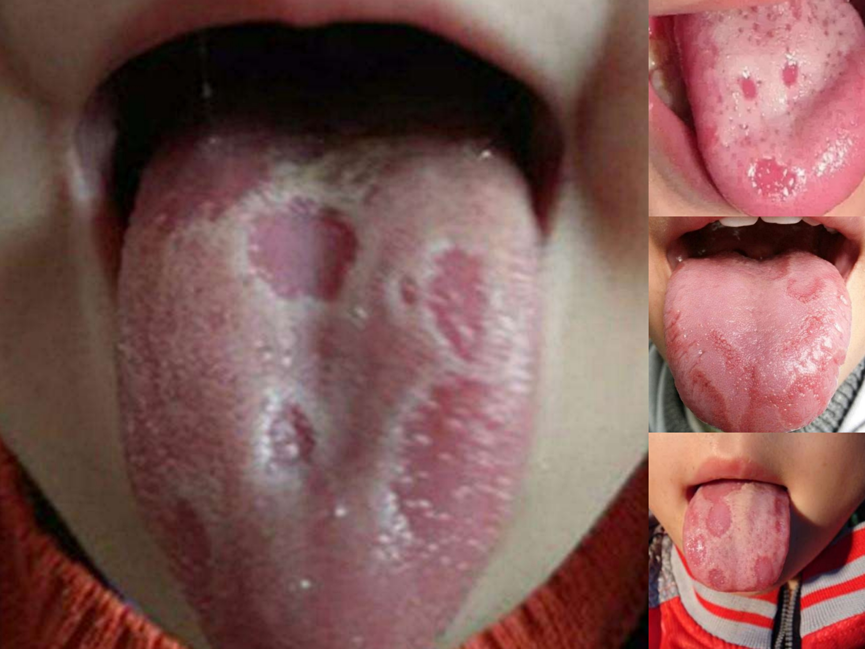Geographic tongue
SYMPTOMS
What is another name for geographic tongue?
Geographic tongue is also known as migratory glossitis, exfoliative glossitis, or erythema migrans.
What factors are associated with geographic tongue?
The exact pathogenesis of geographic tongue remains unclear, but it is related to factors such as gender, age, psychological state, nutrition, and genetics.
Who is more prone to geographic tongue?
It is more common in children, particularly those aged 6 to 18 months, but can also occur in young and middle-aged adults, with a higher prevalence in females than males.
Where does geographic tongue typically occur?
Common sites: Geographic tongue is a superficial, non-infectious glossitis that primarily affects the dorsum of the tongue but may also appear on the lateral edges.
Can geographic tongue heal on its own?
Course of the condition: Geographic tongue has a prolonged course, lasting months or even years, but it usually resolves spontaneously.
What are the manifestations of geographic tongue? What does it look like?
- Main symptoms:
- Tongue coating peeling: In the early stages, one or more raised grayish, circular patches may appear on the tip or edges of the tongue. As the condition progresses, the center of the raised area becomes depressed, turning into a red patch while the surrounding grayish raised border persists. These grayish borders gradually expand outward, and the central red patches also enlarge. Eventually, the borders of different grayish patches merge, forming irregular map-like lesions—this is the peeling process of the tongue coating.
- Tongue coating repair: Over time, these irregular map-like lesions spontaneously resolve within 1 week or several weeks—this is the repair process of the tongue coating.
- Recurrent peeling and repair (migration): While old map-like lesions are resolving, new grayish raised patches may appear elsewhere on the tongue, repeating the peeling and repair process. Over time, the condition may persist for months or even years.

Image source: Reference
- Other symptoms: Apart from recurrent peeling and repair of the tongue coating, geographic tongue usually does not cause other discomfort. However, if complicated by fungal or bacterial infections, symptoms such as burning pain or dull pain may occur.
TREATMENT
How to Prevent or Improve Geographic Tongue?
- Diet: Avoid picky or unbalanced eating habits. Eat more fresh vegetables, fruits, and protein-rich foods such as fish, eggs, and beans. Reduce consumption of fried, grilled, spicy, and greasy foods.
- Lifestyle: Ensure adequate sleep, maintain a regular schedule, go to bed early and wake up early, and avoid staying up late. Pay attention to oral hygiene by brushing and rinsing your mouth frequently. Exercise regularly to strengthen your physique and immunity.
- Mental Health: Learn to manage emotions and avoid excessive stress to prevent negative moods like depression or irritability.
- Symptomatic Treatment:
- If severe malnutrition occurs, identify the specific deficiency (e.g., supplement iron for iron-deficiency anemia).
- If lacking trace elements like zinc, take zinc supplements such as zinc sulfate.
- If deficient in vitamin B, supplement with vitamin B preparations.
- If experiencing burning or dull pain on the tongue, consider bacterial or fungal infections and seek prompt antimicrobial treatment.
The above recommendations apply not only to those already suffering from geographic tongue but also to the general population for prevention.
Note: If these measures fail to alleviate symptoms or the condition worsens, patients should seek medical attention promptly for further diagnosis.
DIAGNOSIS
When should you go to the hospital for geographic tongue?
- If there are only geographic tongue changes without any other discomfort, there is no need to worry excessively. Resting and adjusting your diet may help, as it often heals on its own;
- If the geographic tongue is accompanied by a burning or dull pain, it may indicate a bacterial or fungal infection, and you should seek medical attention promptly;
- If the geographic tongue is combined with severe malnutrition (e.g., iron deficiency anemia, severe micronutrient deficiency, extreme weakness, or emaciation), you should seek medical treatment immediately to identify and address the specific nutritional deficiency to avoid affecting a child's development.
Which department should you visit for geographic tongue?
Dentistry (Oral Medicine).
POTENTIAL DISEASES
What are the possible causes of geographic tongue?
Currently, there is no definitive research clarifying the pathogenesis and etiology of geographic tongue. However, in recent years, many scholars have suggested that geographic tongue may be associated with the following factors:
- Age: Geographic tongue is more common in children, and the likelihood of developing it typically decreases with age. Therefore, it is considered that the onset of geographic tongue may be related to age.
- Gender: The prevalence of geographic tongue is higher in females than in males. Thus, it is speculated that the condition may be linked to estrogen levels in females, though no conclusive research supports this yet.
- Immune factors: Some studies indicate that geographic tongue may be associated with immune factors. The reason could be that children with allergic tendencies are more prone to autoimmune disorders, leading to inflammatory reactions that cause tongue coating detachment and the formation of geographic tongue.
- Genetic factors: Some researchers believe that geographic tongue may be a polygenic genetic disorder.
- Nutritional factors: Studies have found that children deficient in zinc, a trace element, are more likely to develop geographic tongue, suggesting zinc deficiency as a potential cause. Additionally, scholars have observed that children with malnutrition due to picky eating, indigestion, or vitamin deficiencies are also more prone to geographic tongue, indicating malnutrition as another possible cause.
- Psychological factors: Some scholars argue that individuals under high stress are more susceptible to geographic tongue, while others dispute this connection. As such, no definitive conclusion has been reached.
